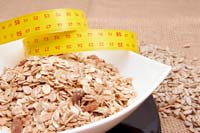6 Ways To Lose Weight When Youve Tried Everything

Is your gut bacteria to blame for your excess fat? Likely it is. We've known since the 1950s that giving livestock low doses of antibiotics fattens them up fast. The younger the animals are, the stronger the effect. A boom for the livestock industry! Then, in December 2013, with concerns over superbugs and antibiotic resistance, the FDA discouraged the use of antibiotics for the sole purpose of increasing the animal's weight. (This restriction is to be phased in over the next three years. Livestock, however, can still be given antibiotics for prevention and treatment of disease.)
It would be ignorant of us to think that giving humans antibiotics wouldn't also impact our weight. Dr. Martin Blaser MD, the director of NYU's Human Microbiome Program and a former chairmen at its medical school, has postulated that the widespread treatment of young children with antibiotics has caused changes in our gut bacteria (called microbiota) and this may be contributing to the rapid increase in childhood obesity.
While obesity has increased three-fold over the past 15 years, more disconcerting is that the higher the body mass index (BMI) range, the more magnified the increase. Since 1989, obese individuals with with a BMI of greater than 30 have doubled, the number of individuals with a BMI of greater than 40 has increased five-fold and the number of those with a BMI greater than 50 has increased ten-fold. Clearly, something more is at play than that just gluttony, slothfulness and processed foods.
Research now suggests that our microbiota can make us fat or skinny. Obese people have a different gut microbial composition than lean people. They have a higher ratio of Firmicutes to Bacteroidetes. One study even found that individuals who had undergone gastric bypass surgery have very different microbe composition from obese people. Firmicutes and Bacteroidetes are bacterial groups not strains. As yet we don't know exactly which strains do what, but we know what happens when the ratio of these to groups increase: more fat!
Researchers now suspect there are a few ways these obesogenic bacteria fatten you up:
- They extract more calories from food.
- They decrease the ability to burn fat by inhibiting an enzyme that breaks down fat.
- They alter the hormones that regulate appetite.
- They convert normally indigestible fiber into glucose which can be stored as fat.
Additionally, pathogenic gut bacteria produce inflammation. This inflammation can contribute to insulin resistance, leaky gut, autoimmune conditions and obesity. One of the most compelling studies confirming the gut bacteria obesity link was conducted in China in 2012. The researchers prescribed a prebiotic-rich diet of whole foods, an exercise program, and Chinese herbs, including berberine, to a morbidly obese man. In 23 weeks, the man had lost 51.4 kg of 174.8 kg initial weight and had reversed his hyperglycemia and hypertension. The inflammation-producing bacteria decreased from 35% to non-detectable.
Given all of this research linking the microbiota and obesity, why would we be so foolish to continue with the calories in-calories out mantra? Obesity is complex, and a big part of this picture is our microbiota. Let's clean it up! Here's how:
1. Identify and eliminate pathogenic microbes such as parasites, yeast and bacteria.
I use stool testing for this but some energy workers and colonic hydrotherapists can also identify this. Follow their elimination protocols.
2. Clean up your diet.
Eat mostly plants, no gluten, no sugar and organic protein only.
3. Heal your gastrointestinal (GI) tract and improve your immunity.
I use glutamine power, slippery elm bark, okra and marshmallow root to help heal the lining of my gut.
4. Replenish the gut microflora with living probiotics.
I use Dr. Ohhira's probiotics which is 100% raw fermented food with probiotics. Sometimes I add in a 12-strain probiotic and will use anywhere from 25-100 billion colony forming units (CFUs).
5. Use antibiotics intelligently.
If you have a sore throat, let it be. You'll resolve it just as quickly by taking anti-fungals such as oregano oil and boosting your immune system with vitamin C and zinc.
6. Make it a cheat meal instead of a cheat day.
A high-fat, high-carb diet changes your microbiota within a day (for the worse)!
Photo Credit: Shutterstock.com
-
***Diet You Can't Cheat On!
Spend two weeks deep in thought about what your favorite foods are.
-
Know all about thyroiditis
There is an important gland in the body, which is most widely k
-
Asbestos Symptoms: Late Indicators
Asbestos symptoms refer to the changes in the body that indicate s
-
Consumer Health Awareness Helps You Lose Weight with Meal Planning
You鈥檝e been planning for quite some time to lose weight. Not only
-
Weight Loss - How Much Weight Do You Really Need To Lose?
For any weight loss plan it is important to decide how much weight do
-
Lose Weight Really Fast - Keep It Safe And Simple
Today the issue of obesity is quite alarming all over the world. This
- DON'T MISS
- 3 Ways Of Measuring Body fat
- Weight Loss Advice For A Healthier Lifestyle
- Does HCG Really Work For Weight Loss?
- The Difference Between Weight Loss Summer Camp And Obese Camp
- Speed Up Metabolism the Natural Way
- San Diego Weight Loss Clinics See Vitamin D and Bariatric Surgery Connection
- How to Lose Belly Fat - Various Quick Tips
- Starving Your Body Is Not The Solution For Weight Reduction: Think About These Things
- The Top Seven Reasons People Break Their New Years Resolutions
- Lose Weight By Making Peace With Your Fat First




